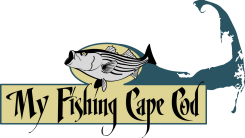
Lauren Collins
I had the wonderful opportunity this year to tour Wild Care, a wildlife rehabilitation center less than a few miles from the Goose Hummock in Orleans.
It was great to meet the staff, see the facility, and learn about the countless hours and dedication they put into helping the wildlife on Cape Cod.
In this post I want to show you what Wild Care's mission is, what they're doing to save wildlife across the Cape, and how you can help if you see an injured or sick animal.
I share this post with you because not only do I want to show you what is happening around Cape Cod that you might not even know about, but also because as fishermen and fisherwomen, you are usually the ones out there seeing animals firsthand, and if you ever see one in distress and want to help, there are options!
More...
Wild Care

I have always been a nature and animal lover, and very much appreciate the efforts people put into saving and rehabilitating wild animals. When we visit Costa Rica, I always enjoy visiting the Osa Wildlife Sanctuary, so when I found a wildlife rehabilitation center right here on Cape Cod, I jumped at the chance to visit.
They are not open to the public, but Ryan and I were lucky enough to meet with the Executive Director of Wild Care, Stephanie Ellis, for a tour of the facility and meet the animals.

Wild Care's Mission
Taken from their website, Wild Care's mission is to "treat injured, ill and orphaned native wildlife for release, to prevent wildlife casualties through public education and live counseling, and to engage the community in conservation through volunteerism.
Since our founding, Wild Care has accepted over 24,000 wild creatures, representing 275 species of native birds, mammals, and reptiles. On average Wild Care receives 1,400-1,800 wild animals per year for treatment. Of those admitted, about half come to us due to injuries and habitat loss due to human activities. It is a vital part of Wild Care’s mission to help educate the public on ways they can avoid harming our animal neighbors."
The number of wild animals in need of care on Cape Cod is staggering. In 2014 they cared for 890 animals, and now in 2019, Wild Care has seen 1,762 animals already, and it's only October!
What Wild Care Does
Many of the animals that come through Wild Care are successfully rehabilitated and released back to the wild. Others may not be able to be released back, either due to irreversible injury, or from being kept in a home with humans and never gaining the knowledge to survive in the wild. Sadly, most animals with severe injuries are euthanized, however under certain special circumstances, some have become our educational animals, like Garv the Eastern Box Turtle and Nickerson the Eastern Screech Owl (pictured below), who stay at Wild Care to help educate the public and are the ambassadors for Wild Care.


When Ryan and I visited in late September, Wild Care was entering the quiet season, having just 77 animals at the center, including numerous species of seabirds, ducks, infant squirrels and two owls, to name a few. To date they have had 1674 animals come through it's doors just this year.
The center is run with the enormous help of it's volunteers, some of whom sponsor an animal and look after it's care each week. If you are interested in learning more about volunteering at Wild Care, you can click here.

Home to the largest aviary in the state of Massachusetts, Wild Care has rehabilitated several bald eagles, egrets, puffins, turkey vultures and other large birds.
Wild Care works with wildlife veterinarians across the Cape, and has an x-ray machine on site to care for animals and get a diagnosis right away.
They also have two saltwater pools to help seabirds and ducks rehabilitate back to the wild.

Many of the injuries they see are from bullet spray during hunting season, being hit by cars and ATV's, debris and litter in waterways, and birds poisoned from eating mice laden with rat poison.
Why Am I Sharing This With You?

As fishermen, there is a responsibility to take your trash and tackle with you when you leave, because otherwise it can end up in our waterways and not only harm the environment, but also the wildlife.
Fishermen also tend to be the most likely to find sick or injured animals out on Cape beaches and along waterways, since you spend so much time out there! If for instance you are on an Outer Cape beach and stumble upon an injured animal that you would like to help, you can call the helpline at 508-240-2255, or you can visit their Animal Help Line page on the website by clicking here.
Trash Your Tackle
If you walk along the beach or the canal, you're more than likely to find tackle and fishing line along with the other trash, only to end up in the water or potentially become entangled with a bird. Wild Care has taken on this issue, introducing a new initiative called Trash Your Tackle.
These receptacles are designed for fishermen, and beach goers alike, to deposit line, hooks, sinkers and any other tackle they wish to trash. Wild Care has partnered with Capabilities to collect the tackle, sending tackle to be recycled, used for learning materials or repurposed into art.
You can find these receptacles at Mitchell River Bridge in Chatham (2 signs/receptacles), Hardings Beach in Chatham (1 receptacle), Barn Hill Road Town Landing in Chatham (1 receptacle) and Strong Island Road Town Landing in Chatham (1 receptacle).

You can learn more about this program by clicking here.
Other Ways To Help
If you're interested in contributing to Wild Care, there are plenty of options. Whether you're interested in sponsoring an animal, choose Wild Care on the Amazon Smile page, offer to volunteer your time or just want to make a one-time donation, you can learn more by clicking here.
Thank you so much for taking the time to learn more about Wild Care. There are a lot of wonderful programs on Cape Cod that you might not know about, and I am excited to share them with you!


Hi Again! Another cool organization on the Cape is the Audubon Society. Mike and I joined the Wellfleet Audubon last year and we’ve really enjoyed many of the programs and hikes the Audubon offers. The impetus behind our joining was an encounter, last November, with a “Turtle Patrol” Audubon volunteer.We assisted in helping to save a “cold stunned” sea turtle who had washed up on beach in Brewster. Migrating sea turtles can become “cold stunned” when the water temp drops in late November. When they are cold stunned they can not swim or eat. They’re at the mercy of the waves and current. Many wash up on beaches and die. After we became aware, we noticed signs posted on the Brewster beaches about what to do if you encounter a cold stunned turtle. Some are small and some are very large depending on the species. It’s hard to tell if they are alive when you see them. The Audubon transports the turtles to a facility where they are warmed and rehabbed.
The turtles were just the beginning of our Audubon experience. The land they own and protect in Wellfleet is just beautiful with great trails. We have walked the trails, I have been on a guided birding hike in Truro and a “hawk watch” in Provincetown (super cool, saw a Peregrine Falcon). Great Organization!
Thank you so much for sharing this Leslie! The Audubon Society is a wonderful organization – I didn’t know they were involved with the turtles on Cape Cod. I will also have to check out those trails!
Thanks for the info Lauren, this is very useful. I didn’t know about Wild Care and I will certainly look for and use the receptacles!
Absolutely Leslie, and when new receptacles are installed I will update the post and let everyone know in the forum too 🙂
thanks for the post Lauren. I know this group well. they are dedicated and very good at what they do. thanks for spreading the word about WILD CARE. the more animals in distress that we can help the better, the less trash the better, simply knowing who to call if an animal needs help is great !!!
Couldn’t agree more! Thanks for reading 🙂